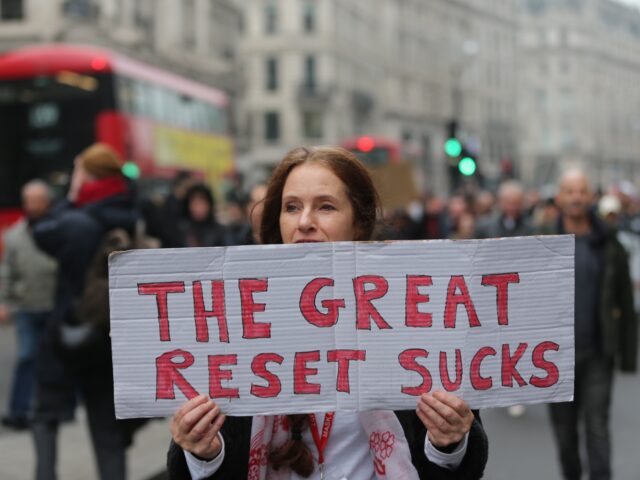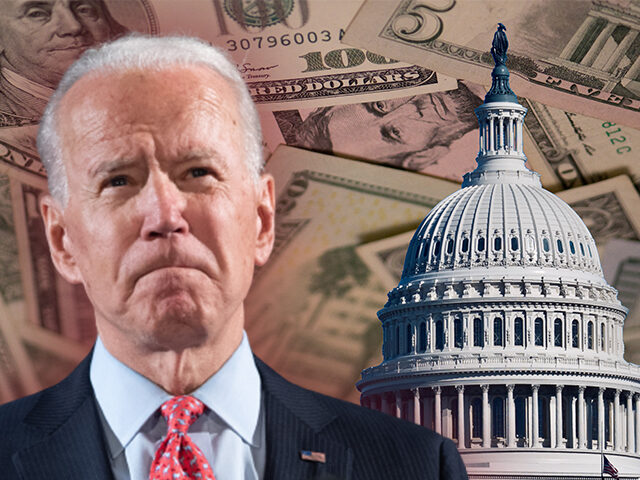RIGHT, JOE. JUST GO OUT AND TALK TO THE PEOPLE ON THE STREETS.
Corporate Bankruptcies are SURGING! | Millions of Households Will Be the Same
White House: ‘You’re Getting a Lot of Partisanship’ in Biden’s Poor Economic Poll Numbers
On Monday’s broadcast of CNBC’s “Squawk Box,” White House Council of Economic Advisers Chairman Jared Bernstein stated that President Joe Biden’s numbers on the economy are poor because “you’re getting a lot of partisanship” in the President’s approval ratings.
Co-host Andrew Ross Sorkin asked, “I imagine you’ve seen the polls, you’ve seen the former President, President Trump’s numbers go up, not down, this after being indicted. How do you explain that and can you explain how the American public is looking and thinking about this economy under this President and why, if the numbers are as positive as you think they are, you think either that message is not getting out or being understood or resonating, what is happening?”
Bernstein responded, “I think part of it depends on what kind of indicators you’re looking at. … When you ask people about the components of Bidenomics, you get very favorable responses, you get numbers in the 70%, in the 75% range. People are very excited about infrastructure. People are extremely content with their job security right now. We recently hit an all-time, historical high in terms of how people are feeling about the quality of their job and their job security. That’s immensely important to this President.”
Sorkin then asked why Biden’s poll numbers don’t reflect that.
Bernstein answered, “I do think that when you ask the question from 30 or 40,000 feet, you’re getting a lot of partisanship and you know that we’re in an extremely partisan time. What I think is much more important, especially when we’re talking about economic policy and we’re talking about markets and the kind of work that you do there at CNBC that I much admire, I think we have to get down to cases. I think we have to ask people specifically about what this administration is doing, how do you feel about finally reversing decades of disinvestment, about fixing that bridge, by the way — and this is federal, state, and local, so I want to make sure the credit goes around — fixing that bridge on I-95 in Philly in two weeks. That is Bidenomics in action at a very granular level. Broadband — high-speed access to broadband for all in rural areas where it hasn’t gone, fixing our ports, fixing our bridges, our roads. All of that crowds in private investment. That’s the exact opposite of the prior view of the kind of top-down cut public investment and cross your fingers and hope it gets you somewhere.”
Follow Ian Hanchett on Twitter @IanHanchett
Inflation Caused By Lockdown Money Printing and Govt Handouts, Admits Central Banker

The decisions by governments around the world to engage in massive spending sprees and money printing during the Chinese coronavirus crisis is the central cause for persistent inflation, a leading central banker has admitted.
The head of the Swiss-based Bank for International Settlements (BIS), Agustin Carstens has acknowledged that governments and central banks throughout the world were to blame for the current economic hardships felt by working and middle-class people through inflationary policies such as governments giving massive handouts to businesses and workers to stay home during the lockdowns and central bankers engaging in quantitative easing schemes to generate more currency.
“While understandable as the Covid crisis broke out, with the benefit of hindsight, it is now clear that the fiscal and monetary policy support was too large, too broad-based and too long-lasting,” the central banker said in comments reported by London’s Daily Telegraph.
Carsten went on to say that problems were exacerbated by central banks keeping interest rates at artificially low levels following the 2008 financial crisis, saying: “Low rates as far as the eye could see encouraged further debt expansion, public and private.
“Moving forward, policy needs to be more realistic in its ambitions and more symmetrical over the business cycle. Buffers used in downturns must be rebuilt in recoveries. Unrealistic expectations that have emerged since the great financial crisis and Covid-19 pandemic about the degree and persistence of monetary and fiscal support need to be corrected.”
The comments from the head of the Bank for International Settlements seemingly contradict previous claims from the Bank of England, which asserted in May that the notion that quantitative easing was a cause of the rampant inflation “is not well supported”.
The Bank of England has come under heavy criticism of late, raising interest rates to 5 per cent in a desperate attempt to quell inflation, which still remains at 8.7 per cent — far above the BoE’s target of 2 per cent. This comes despite the governor of the central bank, Andrew Bailey, claiming in 2021 that the spikes in the cost of goods would be a “temporary” phenomenon.
Last week, Brexit leader Nigel Farage called on the government to sack Bailey for his “economic incompetence”, saying: “Andrew Bailey didn’t see inflation coming when it started he said it was transitory, he didn’t put rates up. And because of that our inflation rate is now higher than that in Europe and in America.
“Now rates are going to soar and anyone with borrowings is going to pay the price. This bloke is a total incompetent. We needed a Brexiteer as governor of the Bank of England, someone who believed in making us competitive.
“He is no good, it’s time he was sacked, it’s time Rishi to ditch the dud.”
Prime Minister Rishi Sunak, a former Goldman Sachs banker who by some estimates is wealthier than King Charles III, has increasingly come under criticism for his handling of the economy as well.
Sweeping into power — against the expressed will of Conservative Party members — in September of last year in a globalist Westminster coup that ousted short-termed PM Liz Truss, Sunak promised to keep taxes at a seventy-year high to tackle the inflation crisis and to pay off the debt accumulated during his tenure as Treasury chief during the Chinese coronavirus lockdowns.
Yet, neither of these plans has materialised, with debt climbing to £2,567.2 billion ($3,2687,200,000,000) or in other terms 100.1 per cent of GDP, the first time that public debt has surpassed GDP since 1961.
As for inflation, which still sits at nearly nine per cent, a poll last week from YouGov found that 82 per cent of voters believed the government was performing poorly in reducing inflation, an increase of six points since May.
A Treasury spokesman said: “We will not hesitate in our resolve to support the Bank of England as it seeks to squeeze inflation out of our economy.
“We rightly spent billions to protect families and businesses from the worst impacts of the pandemic. But we won’t leave future generations with a tab they cannot repay so we have taken difficult decisions to balance the books and get debt falling.”
Follow Kurt Zindulka on Twitter: or e-mail to: kzindulka@breitbart.com
A Nation Enslaved by Hyperinflation: How the Rapid Devaluation of the Dollar Is Screwing Over Your Retirement

The following content is sponsored by Monetary Gold, the official gold sponsor of Breitbart News.
Thanks to President Joe Biden’s aggressive tax-and-spend agenda, the United States hit a historically high debt ceiling of $31.4 trillion. This figure is unprecedented, and economists are scrambling to predict its consequences.
The latest debt ceiling deal suspends the debt ceiling—with no cap—until 2025. What’s worse: The current federal debt doesn’t hold a candle to the new gross national debt pitched in Biden’s budget plan for the 2024 fiscal year. Under the Democrats’ proposal, the national debt will surge from $31.4 trillion to a mammoth $51 trillion in less than a decade.
To put $51 trillion into perspective: The U.S. debt as a percentage of gross domestic product (GDP) will bloat to a record 110 percent—shattering all debt-to-GDP records since the 1940s. The debt held by the American public would more than double—skyrocketing from $19 trillion to upwards of $43 trillion.
Policymakers aim to maintain inflation at 2 percent a year. The consumer price index (CPI), however, idled at over twice that rate—a whopping 5 percent—in the early months of 2023. These jarring numbers tell a simple story: Joe Biden plans to redress his out-of-control spending by hyperinflating the national debt away.
What does this mean for Americans trying to retire? The value of the dollar deteriorates as prices rise—meaning a fixed amount of money will afford significantly less consumption down the road.
No comments:
Post a Comment